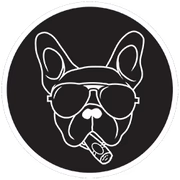The Life of Jose Padron
Nate SimondsIn the world of premium cigars, few names carry as much weight as José Padron, the visionary founder of Padrón Cigars. His story is one of perseverance, dedication, and a true passion for craftsmanship. From humble beginnings to global recognition, José Padron's life is an inspiring tale that showcases the power of determination and hard work.
José Orlando Padrón was born on June 10, 1926, in Pinar del Rio, Cuba. Raised in a family of tobacco farmers, he grew up surrounded by the aroma of tobacco leaves and the art of cigar-making. However, his life took a dramatic turn when his family farm was confiscated, and he fled Cuba amidst political unrest and the rise of Fidel Castro's regime. After first leaving for Spain, Padron later landed in Miami in 1962 with just a dream to his name. After spending time mowing lawns, he was gifted a hammer (which is now encased at their Miami office) and worked 18 hour days as a carpenter to earn money.
Never forgetting his family tradtions, José eventually saved up $600 to restart the family business. In 1964, José Padron founded Padrón Cigars with a small factory in Little Havana, Miami. Still mowing lawns and working as a carpenter, José would go on sales call to sell his “puros” at night. Despite limited resources, he was determined to uphold the Cuban tradition of cigar craftsmanship. Padrón Cigars quickly gained a reputation for producing high-quality cigars using only the finest Nicaraguan tobacco, a move that set them apart from other manufacturers at the time.
Later in 1970, José Padron moved his production to Nicaragua, becoming one of the first in the industry to produce cigars there. After years of success, local riots resulted in the Padron factory burning down. José was thankfully not there, and began scouting other locations for the factory. While the people of Esteli built back the factory, hoping to keep Padron there, the political unrest continued. Eventually the Nicaraguan revolution started, and while this could have been the death of the brand, miraculously, José had charted a plane to carry his prime tobacco out of the country the day before the Nicaraguan President’s palace fell in 1978.
As a result of a US embargo on Nicaraguan products José Padron then started a small factory in Honduras which operated until 2007. At the same time he told his workers in Nicaragua to keep watch over the factory, promising to return. While the war raged around them, the people of Esteli guarded the Padron factory and only 1 small tobacco scale was damaged in the war. Eventually the Sandinista government allowed Jose Padron and the embargo was lifted in 1990, causing Padron to return a majority of the production back to Nicaragua where it has continued ever since.
José Padron's legacy goes beyond the world of cigars. 1978 José had returned to Cuba and met with Fidel Castro to discuss political prisoners he had taken during the revolution, and eventually almost 3000 prisoners were released. While many celebrated this meeting, some extremists took this meeting as a sign that he was a friend of Castros and bombed his Miami locations 3 times from 1979-1982.
The life of José Padron is a story of resilience, passion, and unwavering dedication until his passing in 2017. His story is a testament to the American dream, where hard work, determination, and a commitment to one's craft can lead to incredible success. His contributions to the cigar industry revitalized a tradition that had been impacted by shifting political landscapes and trade restrictions. From his early experiences in tobacco farming to the establishment of a globally renowned cigar brand, José's journey is a source of inspiration for entrepreneurs and enthusiasts alike. His legacy lives on through the cigars his company produces, the artisans he inspired, and the lessons he taught about the power of pursuing one's dreams with unmatched determination.
